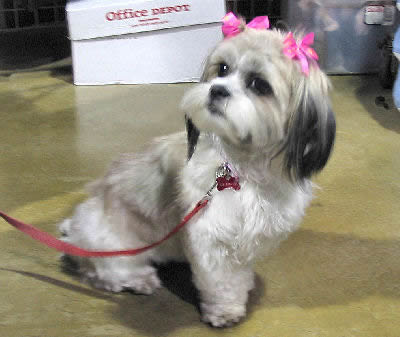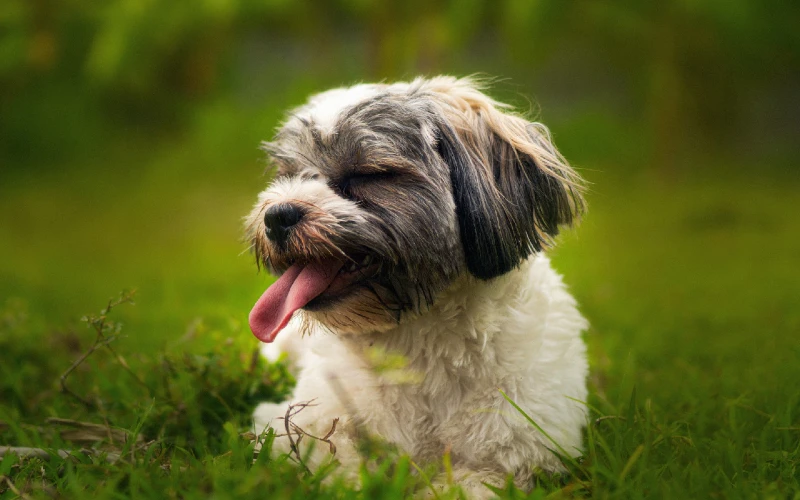
The Shih Tzu is an ornamental toy breed, known for its beauty and happy disposition.
Shih Tzu dog is one of the oldest small dog breeds. They are also called the Chinese Lion Dog, and described as an is an ornamental toy dog breed. They are spunky, loyal, and friendly. They are very attractive, admired for the long hair of their coat. They make both a wonderful show dogs and an excellent companion.
The Shih Tzu is a small dog breed that is basically an indoor pet. It doesn’t require a large amount of space and it doesn’t need a yard. This makes it great for apartment living. As with most toy breeds, the Shih Tzu can be very vocal, but training can reduce indoor barking. Things to look for when choosing a Shih Tzu include eye, ear, and respiratory problems.
- Kingdom: Animalia
- Phylum: Chordata
- Class: Mammalia
- Order: Carnivora
- Family: Canidae
- Genus: Canis
- Species: lupus familiaris
Common Name(s)
Shih Tzu, Chinese Lion Dog, Chrysanthemum Dog, Chinese Shih Tzu
Breed Type
The Shih Tzu is an ornamental toy breed, and one of the oldest dog breeds in the world. Known for its beauty and happy disposition, the Shih Tzu is best suited to moderate to cool climates.
Background
The Shih Tzu is thought to have originated in the seventh century in China. A prized breed, it was not exported to other countries until the 1900s. The Shih Tzu may have been bred from the Lhasa Apso and the Pekingese. Today, Shih Tzus are often crossbred with Poodles, Bichon Frises, and Maltese.
Description
Shih Tzus are known for their small size and long hair. They have short muzzles, large, usually dark eyes, and small ears that are covered with hair. The ‘Apron; is a term used to describe the long hair on the dog’s chest and a ‘Pot Hook Tail’ is a term used to describes the breed’s tail, which is held in an arc.
Shih Tzus can be found in a variety of colors, all of which are acceptable for show purposes. Average height is about 11 inches, and average weight is 9-16 pounds.
Care and Feeding
A Shih Tzu’s diet should include high levels of animal fat and low levels of protein. Good food options include poultry, soy, and rice. Care should be taken not to overfeed, and teeth cleaning chews can be beneficial.
Shih Tzus require lots of brushing, and their hair is usually tied in a topknot if left long. The hair may be trimmed shorter for easier care, but this should not be done with show dogs. Teeth require special care and observation. Some Shih Tzu owners have their dewclaws removed, but this is optional.
Shih Tzus are usually fairly healthy, but yearly checkups are advised. Vaccinations should be administered on the following schedule:
- 6-8 weeks: Distemper, Leptospirosis, Hepatitis, Parainfluenza, Parvo, and Corona virus (DHLPPC)
- 10-12 weeks: Second DHLPPC
- 14-16 weeks: Third DHLPPC and rabies
- Annually: DHLPPC and rabies booster
Due to the Shih Tzu’s frequent respiratory problems, it is advisable to keep their environment as dust-free as possible. They shed very little hair and dander.
Housing Your Dog
The Shih Tzu is an indoor dog, and does not require a large amount of space or a yard. They are sensitive to high temperatures, so they should be kept inside with the air conditioning on during hot weather.
Social Behaviors
Shih Tzus are friendly dogs, and tend to get along well with most people. They usually do well around well-behaved children and other pets of all types.
Handling and Training
The Shih Tzu is somewhat stubborn, so training requires patience and consistency. They may be difficult to housebreak.
Activities
Shih Tzus are playful and active, and they need to be walked daily. They enjoy playing with dog toys, and like to go outside without a leash every now and then.
Breeding/Reproduction
Eye, ear, and respiratory problems are things to consider when looking for a mate to breed a Shih Tzu with. Litters usually consist of three to five puppies, and whelping is usually uncomplicated unless the mother is small.
Common Health Problems
Potential health problems include ear, eye, and respiratory problems, as well as spinal disc disease. This breed also has a tendency toward dental problems, so its teeth should be checked regularly by a veterinarian.
Availability
Due to the Shih Tzu’s popularity, breeders can be found in most areas. Prices range from $300 to over $1,000.
References
“Shih Tzu“, Dog Breed Info Center, Copyright 1998-2008
“Shih Tzu“, Wikipedia, Copyright 2008
“Choosing a Shih Tzu“, PetPlace.com, Intelligent Content Corp., Copyright 1999-2008
Cusick, William D., “What to Feed a Shih Tzu“, Referenced online, 2008
“Shih Tzu Puppies for Sale“, Copyright PuppyFind.com, LLC, Referenced online, 2008
“Shih Tzu and Other Dogs: Canine Terminology Glossary of Terms“, Terridon Shih Tzu and Terricom.com, Copyright 1998-2006, Referenced online, 2008
Featured Image Credit: Dennis Bautista, Pexels
